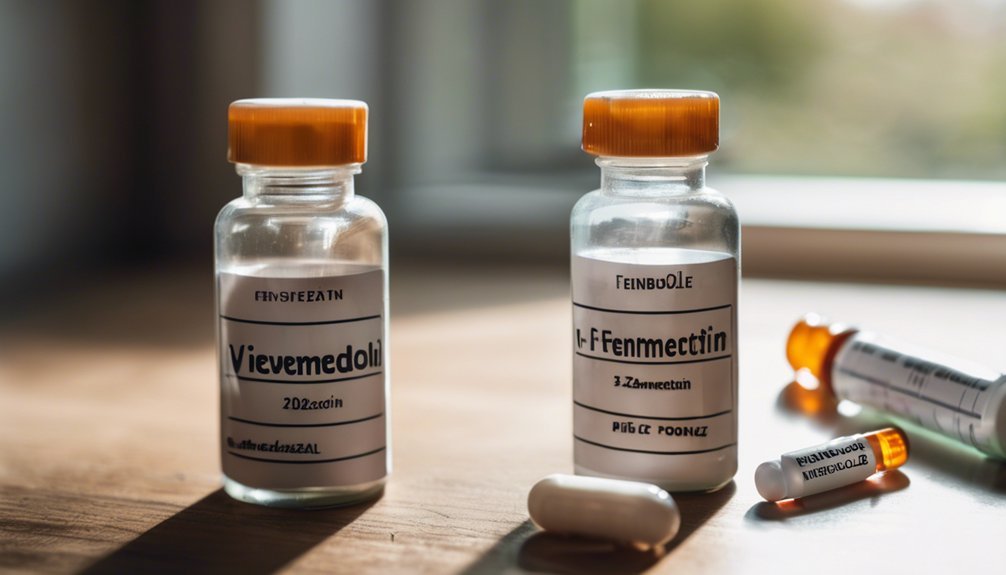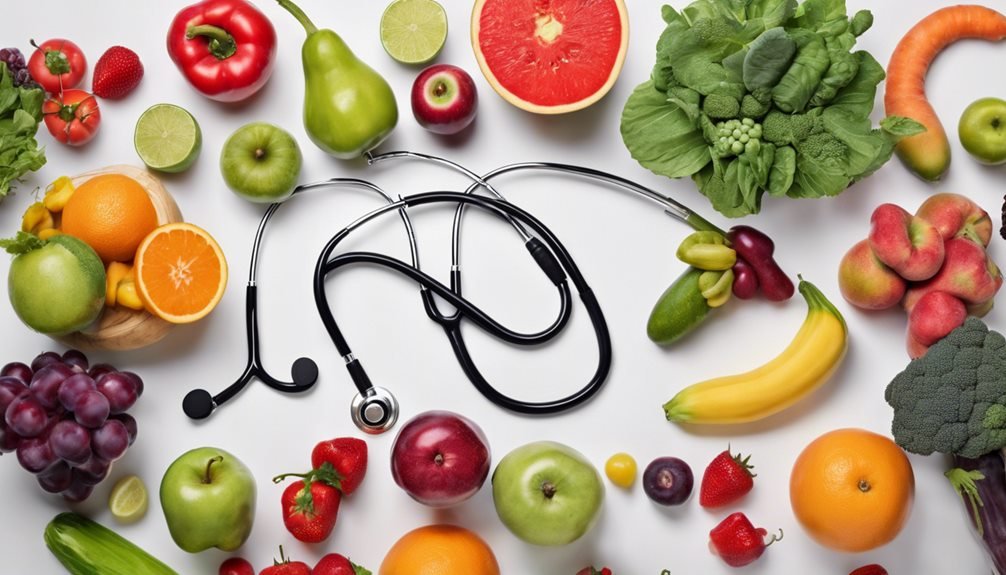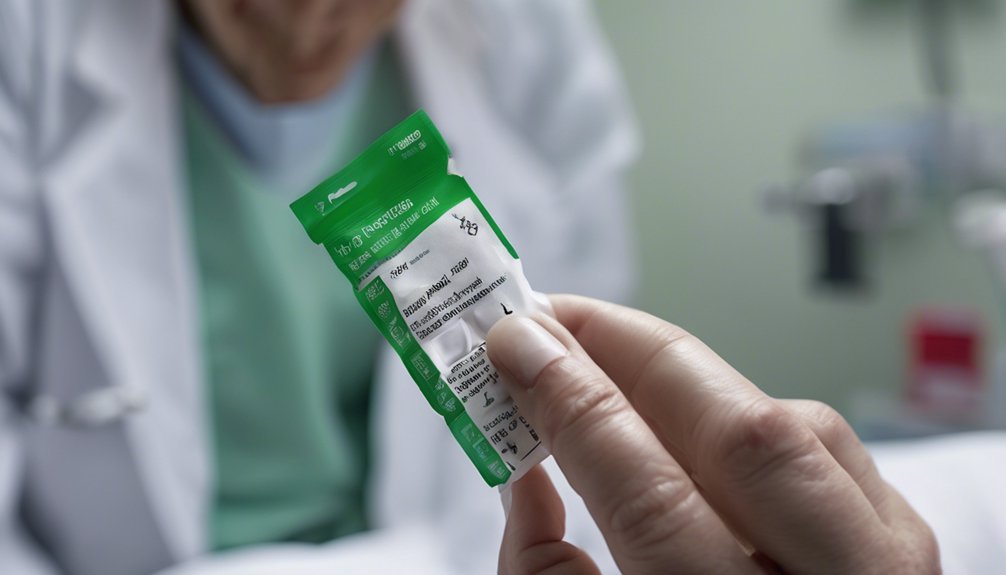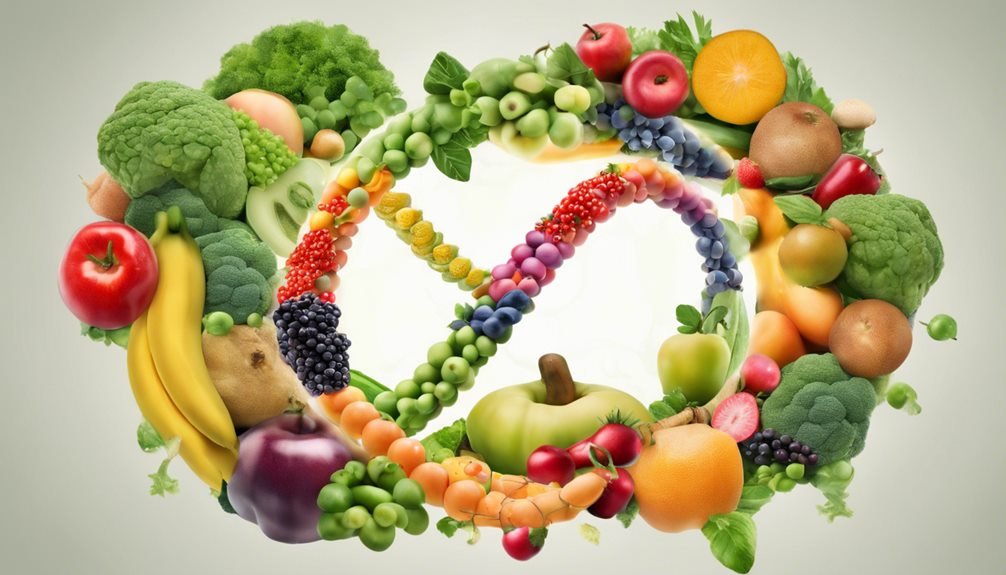When battling cancer, the impact of your diet can be more significant than you might imagine. From influencing treatment effectiveness to supporting your immune system and reducing inflammation, the foods you consume play a crucial role in your journey towards recovery. Understanding how specific nutrients and dietary choices can affect your body's ability to cope with treatments and potentially enhance their outcomes is key. So, before you make your next meal choice, consider the vital role your diet plays in your fight against cancer.
Key Takeaways
- Proper nutrition supports immune function and healing during treatment.
- Antioxidants in diet protect healthy cells and enhance treatment effectiveness.
- Sugar can fuel cancer cell growth and lead to inflammation.
- Plant-based diets offer anti-inflammatory benefits and support immune function.
- Omega-3 fatty acids reduce inflammation and may have tumor-suppressive effects.
Importance of Nutrient-Rich Foods
When undergoing cancer treatment, the importance of consuming a diet rich in nutrients can't be overstated. Maintaining a proper calorie balance is crucial during this time as your body requires adequate energy to fight off the illness and cope with the side effects of treatment. Ensuring that you're consuming enough calories from nutrient-dense foods will support your overall well-being and help you feel stronger throughout the treatment process.
In addition to calorie balance, focusing on nutrient absorption is key. Cancer treatments can sometimes affect your body's ability to absorb nutrients effectively, making it even more important to choose foods that are rich in vitamins, minerals, and antioxidants. These nutrients play vital roles in supporting your immune system, promoting healing, and reducing inflammation.
Role of Antioxidants in Therapy
The integration of antioxidants into cancer therapy plays a crucial role in supporting your body's ability to combat the disease and alleviate treatment side effects. Antioxidants help counteract oxidative stress, which is caused by an imbalance between free radicals and antioxidants in the body. Free radicals are unstable molecules that can damage cells and contribute to the development of cancer.
By incorporating antioxidants like vitamin C, vitamin E, and beta-carotene into your diet, you can help neutralize free radicals and reduce oxidative stress.
Studies have shown that antioxidants not only aid in cancer treatment but also help protect healthy cells from damage during therapy. Including foods rich in antioxidants, such as berries, nuts, and leafy greens, can enhance the effectiveness of cancer treatments and improve your overall well-being.
Impact of Sugar on Cancer Cells

As you navigate the complex landscape of cancer treatment, another significant factor to consider is the impact of sugar on cancer cells. Understanding how sugar metabolism influences cancer progression can empower you to make informed dietary choices. Here are some key points to consider:
- Fueling Cancer Growth: Cancer cells have a heightened need for energy, and they often rely on sugar (glucose) to fuel their rapid proliferation.
- Warburg Effect: The Warburg effect describes how cancer cells preferentially metabolize glucose through glycolysis, even in the presence of oxygen, to support their growth.
- Insulin Resistance: High sugar consumption can lead to insulin resistance, which not only affects blood sugar levels but also creates an environment conducive to cancer development and progression.
- Inflammation: Excessive sugar intake can trigger chronic inflammation in the body, promoting conditions that are favorable for cancer cells to thrive.
Being mindful of your sugar intake and its impact on cancer cells can be a valuable component of your overall cancer treatment strategy.
Benefits of Plant-Based Diet
Considering the impact of diet on cancer treatment outcomes, exploring the benefits of a plant-based diet can offer valuable insights into how your food choices can influence your health journey.
A plant-based diet rich in fruits, vegetables, whole grains, legumes, and nuts can provide numerous advantages. One key benefit is the high fiber intake associated with plant-based foods. Fiber plays a crucial role in maintaining digestive health, regulating blood sugar levels, and promoting overall well-being.
Additionally, plant-based foods are packed with phytonutrients, which are natural compounds that have been shown to have anti-inflammatory and antioxidant properties. These phytonutrients help protect cells from damage and support the body's immune system in fighting off diseases, including cancer.
Influence of Omega-3 Fatty Acids
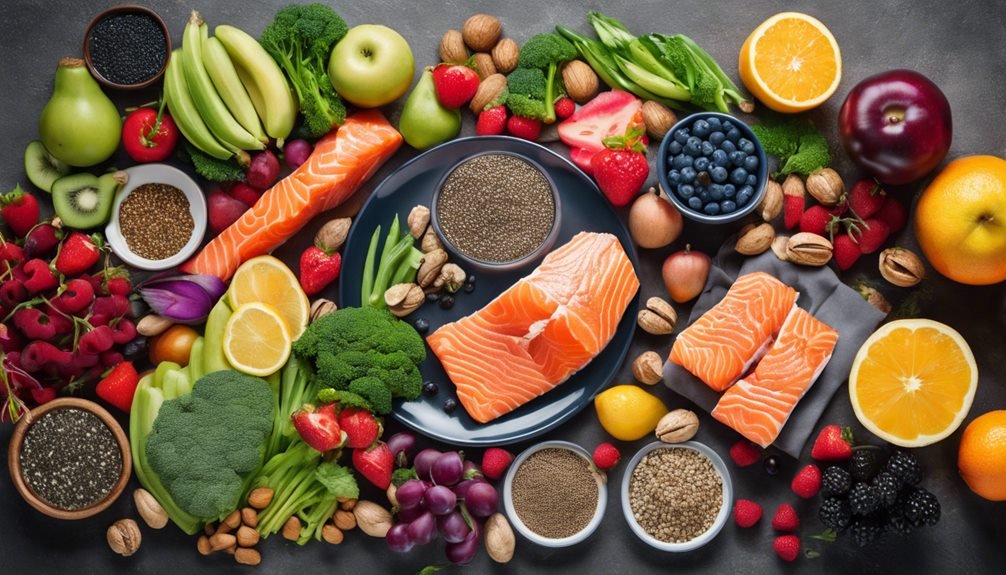
Enhancing your diet with omega-3 fatty acids can play a significant role in supporting your overall health, particularly during cancer treatment. Omega-3 fatty acids have shown promising results in clinical trials for cancer patients, indicating their potential treatment implications. Here are some ways omega-3 fatty acids can benefit you:
- Reduced Inflammation: Omega-3s help decrease inflammation in the body, which is crucial during cancer treatment to enhance the body's ability to fight the disease.
- Improved Immune Function: By supporting immune function, omega-3 fatty acids can aid in maintaining a strong defense system while undergoing cancer treatment.
- Enhanced Quality of Life: Studies suggest that omega-3s may contribute to improved quality of life for cancer patients by reducing treatment-related side effects.
- Potential Tumor-Suppressive Effects: Some research indicates that omega-3 fatty acids might've tumor-suppressive effects, which could be beneficial in cancer treatment strategies.
Considering these potential benefits supported by clinical trials, incorporating omega-3 fatty acids into your diet could be a valuable addition to your cancer treatment journey.
Connection Between Gut Health and Treatment
When managing cancer treatment, the connection between gut health and its impact on treatment outcomes is a crucial aspect often overlooked. The gut microbiota, a diverse community of microorganisms residing in the digestive tract, plays a significant role in various bodily functions, including immune response and nutrient absorption. Research suggests that the composition of gut microbiota can influence how well a patient responds to cancer treatment.
Dietary interventions can help maintain a healthy gut microbiota, potentially enhancing the effectiveness of cancer therapies. Consuming a diet rich in fiber, fruits, vegetables, and probiotics can promote a balanced gut microbiome.
On the contrary, diets high in processed foods, sugar, and unhealthy fats may negatively affect gut health.
Effects of Hydration on Recovery
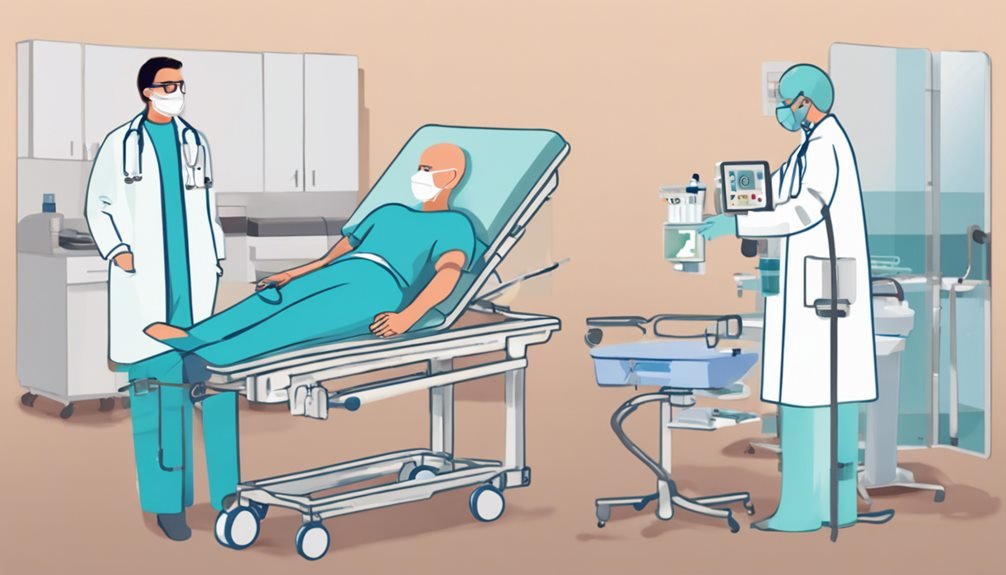
As you focus on managing your cancer treatment, it's important to recognize the significant impact hydration can have on your recovery process. Proper hydration plays a crucial role in supporting your body as it goes through treatment and healing. Here are some key points to consider:
- Electrolyte balance: Maintaining the right balance of electrolytes in your body is essential for functions like muscle contractions and nerve impulses. Adequate hydration helps keep these electrolytes at the right levels, aiding in your recovery.
- Fluid retention: Staying well-hydrated can help prevent issues like dehydration and fluid retention, which may occur as side effects of certain cancer treatments. Proper hydration can assist in managing these symptoms effectively.
- Renewed energy: Hydration supports your body in functioning optimally, providing you with the energy needed to cope with the demands of treatment and recovery.
- Detoxification: Ample hydration helps flush out toxins from your body, allowing your organs to work efficiently in eliminating waste and supporting the healing process.
Considerations for Protein Intake
To optimize your body's response to cancer treatment, paying attention to your protein intake is crucial. Protein plays a vital role in supporting your immune system, aiding in tissue repair, and promoting overall health during cancer treatment. Ensuring an adequate protein intake is essential for protein synthesis, which is crucial for rebuilding tissues damaged during therapy and maintaining muscle mass.
Maintaining a proper nutritional balance is key in supporting your body's ability to cope with the side effects of treatment. Protein-rich foods like lean meats, fish, eggs, dairy, legumes, and nuts can help meet your body's increased protein needs. Aim to include a source of protein in each meal and snack to support your body's recovery process.
Significance of Vitamin D Levels
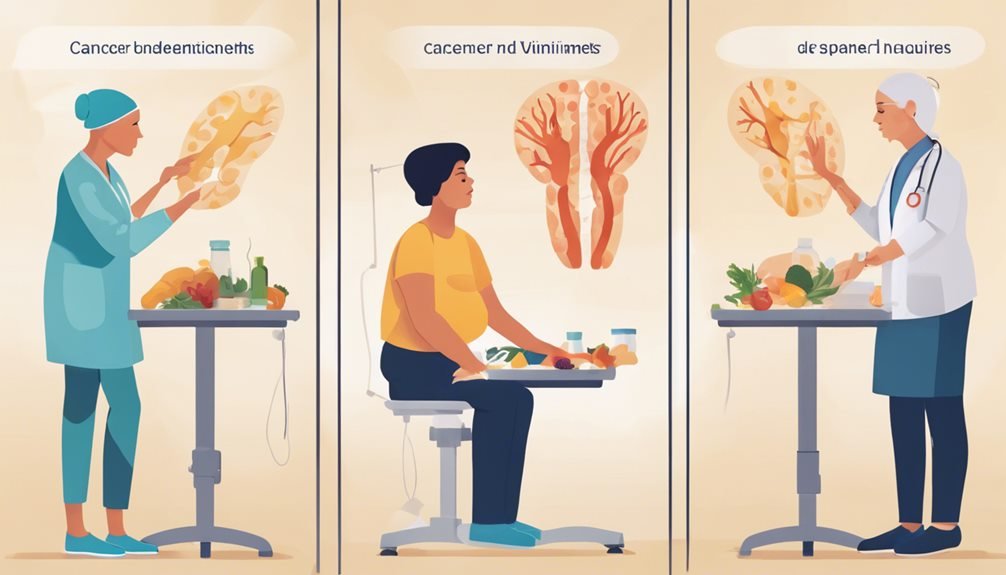
Optimizing your vitamin D levels can significantly impact your cancer treatment outcomes.
Importance of Vitamin D Levels:
- Vitamin D Deficiency: Low levels of vitamin D have been linked to poorer cancer prognosis and treatment outcomes.
- Sunlight Exposure: Spending time outdoors can help your body produce vitamin D naturally.
- Dietary Recommendations: Include foods rich in vitamin D such as fatty fish, fortified dairy products, and eggs in your meals.
- Supplementation: If needed, your healthcare provider may recommend vitamin D supplements to ensure you meet optimal levels.
Maintaining adequate vitamin D levels is crucial for your overall health and well-being during cancer treatment. By following dietary recommendations and discussing supplementation with your healthcare team, you can support your body in its fight against cancer. Remember, small changes in your diet and lifestyle can make a big difference in your treatment journey.
Herbal Supplements and Their Role
Enhancing your cancer treatment journey with herbal supplements can offer additional support and potential benefits. Herbal remedies and dietary supplements have been used for centuries to aid in various health conditions, including cancer. While these supplements may not replace conventional cancer treatment, they can complement your current regimen and improve overall well-being.
Certain herbal supplements, such as green tea extract and turmeric, have shown promising anti-cancer properties in studies. Green tea extract contains antioxidants that can help protect cells from damage, while turmeric has anti-inflammatory effects that may inhibit cancer cell growth.
Additionally, herbs like ginseng and astragalus have been linked to boosting the immune system, which is crucial for fighting off cancer cells.
Before incorporating herbal remedies or dietary supplements into your routine, it's important to consult with your healthcare team. Some supplements may interact with cancer treatments or medications, affecting their effectiveness. Your healthcare provider can guide you on the appropriate dosage and ensure that these supplements are safe for you to use alongside your cancer treatment plan.
Risks of Processed Foods
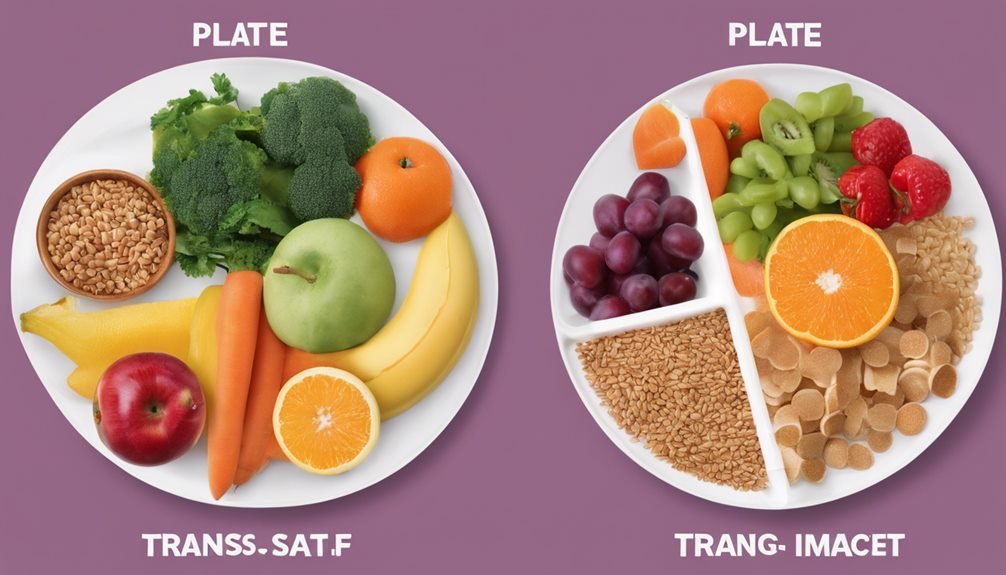
Processed foods, often convenient and readily available, can pose significant risks to your health, especially during cancer treatment. When battling cancer, it's crucial to be mindful of what you consume to support your body's fight against the disease. Here are some of the dangers of processed foods and how they can impact your cancer treatment:
- High in Added Sugars: Processed foods are often loaded with hidden sugars that can weaken your immune system and promote cancer cell growth.
- Packed with Artificial Ingredients: These foods contain artificial flavors, colors, and preservatives that may disrupt your body's natural processes, affecting treatment outcomes.
- High in Trans Fats: Trans fats found in processed foods can lead to inflammation and interfere with the effectiveness of cancer therapies.
- Low in Essential Nutrients: Processed foods lack essential vitamins and minerals needed to support your immune system during cancer treatment.
Being mindful of the risks associated with processed foods can help you make informed dietary choices to optimize your cancer treatment outcomes.
Personalized Nutrition Plans
When navigating the complexities of cancer treatment, your dietary choices can play a pivotal role in supporting your health and well-being. Personalized nutrition plans tailored to your genetic mutations and metabolic pathways can optimize your body's response to treatment and enhance overall outcomes.
Genetic mutations can influence how your body processes nutrients and responds to certain foods, making personalized nutrition crucial for addressing specific needs. By understanding your unique genetic makeup, healthcare providers can design a nutrition plan that supports your body's ability to fight cancer effectively.
Metabolic pathways, the processes by which your body converts food into energy, also play a significant role in cancer treatment. Certain foods may interact with these pathways in ways that either support or hinder your body's ability to combat the disease. Personalized nutrition plans take into account these intricate interactions, aiming to provide you with the best possible support during treatment.
Frequently Asked Questions
Can Specific Foods Interfere With Chemotherapy Effectiveness?
Specific foods, especially high in antioxidants, can potentially interfere with chemotherapy effectiveness. Nutritional supplements, often not regulated like medications, may have unexpected interactions. Gut health plays a crucial role in how your body absorbs nutrients. Always consult your healthcare team before making significant dietary changes during cancer treatment. They can provide personalized guidance to ensure your diet supports your overall health and treatment outcomes.
Are There Certain Antioxidants to Avoid During Treatment?
When undergoing treatment for cancer, it's crucial to be mindful of antioxidant interactions. Certain antioxidants can potentially interfere with the effectiveness of your treatment. Your healthcare provider may recommend specific dietary restrictions to avoid any negative impact on your therapy. By following these guidelines, you can optimize your chances of successful treatment outcomes. Trust your medical team to provide you with the best advice tailored to your individual needs.
How Does Sugar Consumption Affect Radiation Therapy Outcomes?
When undergoing radiation therapy, your sugar intake can impact outcomes. High sugar consumption may fuel cancer cells, potentially reducing the effectiveness of radiation treatment. To support your therapy, opt for a balanced diet low in added sugars.
This choice can help enhance the benefits of radiation therapy and improve your overall well-being during cancer treatment. Consult with your healthcare team for personalized dietary recommendations tailored to your needs.
Can a Plant-Based Diet Prevent Cancer Recurrence?
Embracing a plant-based diet can support cancer prevention by providing vital nutrients and antioxidants. Nutritional supplements can enhance this approach, filling any dietary gaps. Remember, dietary restrictions may vary based on individual needs, so consult with healthcare professionals for personalized advice.
What Role Do Omega-3 Fatty Acids Play in Hormone Therapy?
Omega-3 benefits include aiding hormone regulation, which is crucial for your body's overall health. These fatty acids can support hormone therapy by promoting a balanced hormonal environment. Ensuring you have an adequate intake of omega-3s can potentially enhance the effectiveness of hormone treatments. Incorporating sources of omega-3 fatty acids into your diet can be a valuable addition to your hormone therapy regimen. Always consult with your healthcare provider for personalized advice.
Conclusion
As you navigate through the maze of cancer treatment, remember that every bite you take can make a difference. Fuel your body with nutrient-rich foods like colorful vegetables and omega-3 rich fish to give your immune system the strength it needs to fight back. Say no to processed foods that can harm your progress and embrace a personalized nutrition plan tailored to your unique needs. Your journey towards healing begins with the power of your plate.


